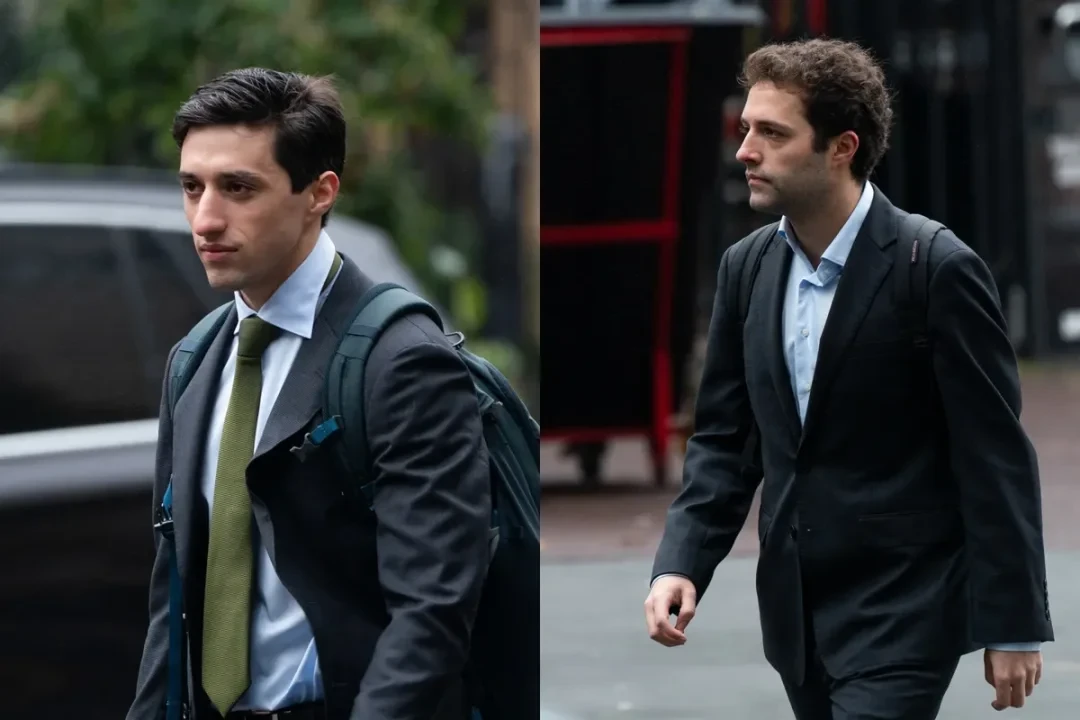Original article by Miles J. Herszenhorn, Bloomberg
Original translation: Luffy, Foresight News
Two brothers, recent MIT graduates, went to trial this week in a case that could shed light on a secretive and controversial cryptocurrency trading strategy.
James and Anton Peraire-Bueno are accused of stealing approximately $25 million from other traders on the Ethereum blockchain through a so-called "sandwich attack." The brothers have pleaded not guilty, arguing that their actions were reasonable within the unregulated market and that their alleged victims were engaging in similar trades.

Anton Peraire-Bueno (left) and James Peraire-Bueno (right) arrived at the federal court in New York on Tuesday.
The case has divided the cryptocurrency community, with many hoping the trial, which begins Wednesday in Manhattan federal court, will clarify the rules governing "maximum extractable value" (MEV) strategies, which reorder, exclude, or include transactions before they are uploaded to the blockchain.
“Honestly, I never thought this was a crime,” Evan Van Ness, chief investment officer at cryptocurrency trading firm TXPool Capital, said of the case against the brothers. “If people think crypto is the Wild West, MEV is the Wild West of crypto.”
While some MEV practices are believed to improve cryptocurrency market efficiency, sandwich attacks, like those perpetrated by the Peraire-Bueno brothers, are more controversial. Attackers use bots to insert orders before and after other users' trades, driving up prices and then immediately selling them for a profit at the expense of the users caught in the middle. While some consider this market manipulation, it's not currently illegal.
Companies that carry out sandwich attacks are typically secretive and often go to great lengths to conceal their identities. However, one such company will be brought to light during the trial of the Peraire-Bueno brothers. Court documents reveal that the brothers' primary alleged victim is Savannah Technologies, a little-known Israeli company. The company's CEO, David Yakira, is expected to testify as a prosecution witness about how the brothers targeted Savannah's MEV robots, resulting in $13 million in losses.
An attorney for the Peraire-Bueno brothers declined to comment. Lawyers for Yakira and Savannah Technologies also declined to comment. Prosecutors did not respond to requests for comment.
Prosecutors allege that James, 29, and Anton, 25, developed their sting plan after studying the trading behavior of the sandwich attackers, who program bots to sift through pending transactions on the blockchain to identify profitable targets—typically large transactions or those involving low-liquidity tokens.
The prosecution alleges that the brothers implemented the scheme in April 2023 by initiating numerous small, low-liquidity trades to attract the targeted bots. Experts hired by the defense described in court documents that one bot invested nearly $5 million to exploit a single trade by the Peraire-Bueno brothers worth less than $700.
Prosecutors also allege that the brothers discovered a vulnerability in the code of MEV Boost, an open-source software primarily used by Ethereum network operators. The prosecution alleges that this vulnerability allowed the Peraire-Bueno brothers to view the complete contents of proposed blocks and reorder them for their own benefit—essentially selling illiquid cryptocurrencies just after the sandwich attack bot had purchased them.
“The brothers essentially tricked the bots into performing a secure sandwich attack that should have been within the network’s rules,” said Matt Cutler, CEO of Blocknative Corp, a blockchain infrastructure company. “But because of this vulnerability, the attack wasn’t secure.”
The defense argued that the companies that carried out the sandwich attack voluntarily completed the transaction and the ownership of the funds was transferred.
Defeating the Robots: Tech-Powered Methods of Elite Universities
Prosecutors allege that the brothers learned the technical skills necessary to carry out the alleged fraud at "one of the most prestigious universities in the United States." Anton graduated from MIT in 2024 with a bachelor's degree in computer science and engineering, while James earned both a bachelor's and a master's degree in aerospace engineering from the same university several years earlier. An MIT spokesperson declined to comment on the case.
Prosecutors sought to frame the case as a simple theft, focusing the jury on the brothers' actions. To prove criminal intent, they planned to point to Anton's online searches for "Which is worse, jail or prison?" and "Where do criminals typically hide their money?" The most serious fraud charge the brothers faced carried a maximum sentence of 20 years in prison.
Before the trial, prosecutors said they wanted to minimize any mention of the sandwich attack. They asked U.S. District Judge Jessica Clarke to bar the brothers from presenting expert testimony on the sandwich deal, arguing that "their actions constituted fraud regardless" and that "excessive discussion of the sandwich attack could prejudice the jury against the prosecution's victims."
Clarke ruled last week that the Peraire-Bueno brothers can allow most of their experts to testify, provided they refrain from victim blaming.
It can be a fine line, as the brothers seek to explain their actions in the context of what their lawyers call “high-stakes, adversarial behavior.” In a recent court filing, they disputed prosecutors’ allegations of wrongful intent:
"A person attempting to thwart a sandwich attack and defeating the MEV robot with the attacker's own tactics reasonably believes they have done nothing wrong," the Peraire-Bueno brothers wrote in the filing.
A highly secretive world
Some in the cryptocurrency community, who believe the charges against the Peraire-Bueno brothers are justified, acknowledged their misgivings about the sandwich attack.
“Even if you believe MEV searchers (aka sandwich attackers) are bad actors, that doesn’t justify stealing their money,” Ethereum Foundation researcher Dankrad Feist wrote on the X platform in May 2024. “Stealing from a thief is still theft.”
Feist said Tuesday that his opinion on the case has not changed since the post.
A report cited by both the prosecution and the defense showed that 75% of sandwich attacks could be traced back to just 20 accounts, but little information was known about those accounts.
Savannah Technologies and Yakira have similarly low public profiles. According to Yakira's LinkedIn profile, he graduated from the Hebrew University of Jerusalem in 2015 and subsequently pursued a PhD in cryptography at the Technion-Israel Institute of Technology. From 2017 to 2020, he served as the head of research at Orbs, an Israeli cryptocurrency company.
The identities of the traders the Peraire-Bueno brothers are accused of stealing $12 million from other traders remain unknown.
“MEV is a highly secretive world,” Cutler said, recalling cryptocurrency conferences where “traders wore motorcycle helmets to conceal their identities.” He said it will be interesting to see “how the judge and jury deal with the complex issues related to MEV in the case.”
"At the very least, I will be watching the trial closely to see how much depth of consideration the court will demonstrate as it considers future precedent," he said.
- 核心观点:MIT毕业生MEV三明治攻击案引发法律争议。
- 关键要素:
- 兄弟被控利用MEV漏洞窃取2500万美元。
- 利用MEV Boost代码漏洞操纵交易排序。
- 75%三明治攻击集中于20个隐秘账户。
- 市场影响:为MEV策略合法性确立司法先例。
- 时效性标注:长期影响



